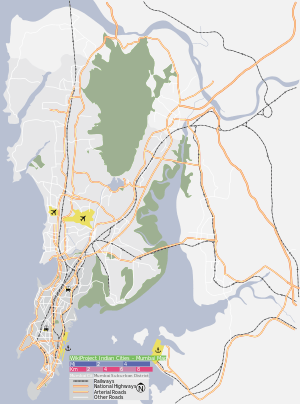Sunder Nagar
| Sundar Nagar सुंदर नगर | |
|---|---|
| Region | |
 Sundar Nagar Location in Mumbai, India | |
| Coordinates: 19°10′36″N 72°50′38″E / 19.1766°N 72.844°ECoordinates: 19°10′36″N 72°50′38″E / 19.1766°N 72.844°E | |
| Country |
|
| State | Maharashtra |
| District | Malad |
| Metro | Mumbai |
| Zone | 5 |
| Ward | P/North |
| Government | |
| • Body | MCGM |
| Elevation | 13 m (43 ft) |
| Languages | |
| • Official | Marathi |
| Time zone | IST (UTC+5:30) |
| PIN | 400 064 |
| Lok Sabha constituency | Mumbai North |
| Vidhan Sabha constituency | 43 |
| Civic agency | MCGM |
Sunder Nagar is a region in the suburban area of Malad–Goregaon in Mumbai, India.[1] It lies in west of the arterial Swami Vivekanand Road and is mostly a residential neighbourhood.[2] It was built up in the 1970s during the city's population and construction boom. The name Sunder Nagar means "beautiful place" in Hindi. There was a community called "Vijaykar Wadi" before 1970 and its name was changed to "Sunder Nagar". "Wadi" means group of trees, there were many "Mango" and "Chikoo" trees in the area, still some can be seen in the park maintained by "The Sunder Nagar Welfare Association".
The area is also known for its educational institutes, with two schools "Umedbhai Patel English School", "Cambridge Education", Sarvoday Girls School and two college, Prahldrai Dalmia's Lions College and Ghanshyamdas Saraf College, which are affiliated to University of Mumbai.[3] To the north lies Mandlik Nagar. The area also encompasses a few parks to the south.
The residents are mostly Gujaratis - Hindus as well as Muslims. A small Sikh community is centred on a small Gurudwara. There is a huge Middle-class Gujarati, Marwari community in and around Sunder Nagar. About 75% of the population of Sunder Nagar is Hindu, the rest mainly Muslim. There are several bakeries and Dairy shops. There are three educational institutions - the Sarvapalli Radhakrishnan Vidyalaya, the Umedbhai Patel School and the Dalmia College. Sunder Nagar has buildings named by English alphabet and are merely in alphabetical order. The most populated building is P Unit while the least populated is M unit. This region has a medium-sized ground almost in the center, with having facilities to play cricket, football, badminton as well as athletics. Main road in this area is Sundarnagar Road which is directly perpendicular to SV Road through the Vadapav seller port Jumboking.
Sunder Nagar is an area near to Chincholi Bundar and Bangur Nagar. The place is believed to have an enormous population but there is not much increase in its density of population since the last decade due to absence of new building construction, however, the most-centered unit R is being reconstructed since the last two years and will give houses to about 250 families. Sunder Nagar is a place could be in around our surrounding (in simple words could be reached) in about 20 minutes from both its near railway stations- Malad and Goregaon just by walking, a 3-4 minute drive from both these areas is enough to reach here. Sunder Nagar has many Medical, Departmental and foodworks stores like Rajasthan Medical, Swastik Supermarket, Popular Stores, Mafco Farmhouse, Ankur Dairy Shop and Jumboking.
Sunder Nagar Garden is known to have a nice place to walk, jog, play, eat, drink and enjoy. Children (12 or below) mostly play in garden where there is a playing facility of seesaw, slides, rest area and food area, while teenagers tend to play Football or Cricket in Ground. A Sunder Nagar walking track here is often done by all-aged people and is approximately 600 metres long which can be walked in about 7 minutes, with having sights of Garden, Ground, Building as well as Umedhbhai and Radhakrishnan School.
References
- ↑ "Central Excise and Sales Tax". Central Excise and Sales Tax. Retrieved 2007-04-21. External link in
|work=(help) - ↑ "City Briefs". Mumbai Mirror. Bennett, Coleman & Co. Ltd. 2001-10-31. Retrieved 2007-04-21. External link in
|work=(help) - ↑ "Appellate Authorities and Public Information Officers". University of Mumbai. Retrieved 2007-04-21. External link in
|work=(help)